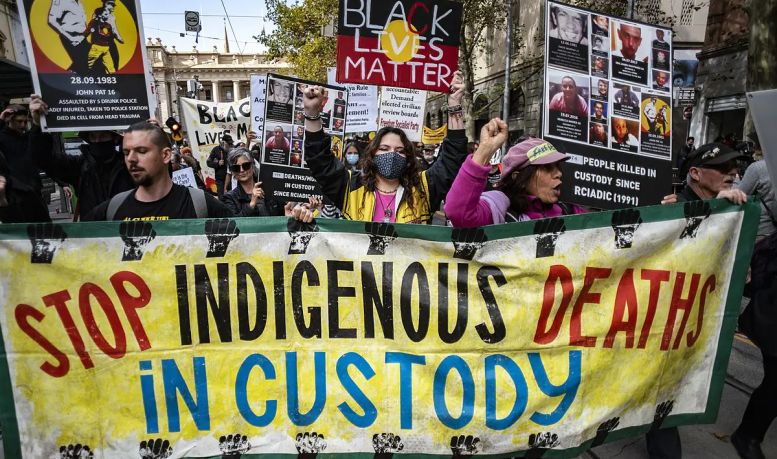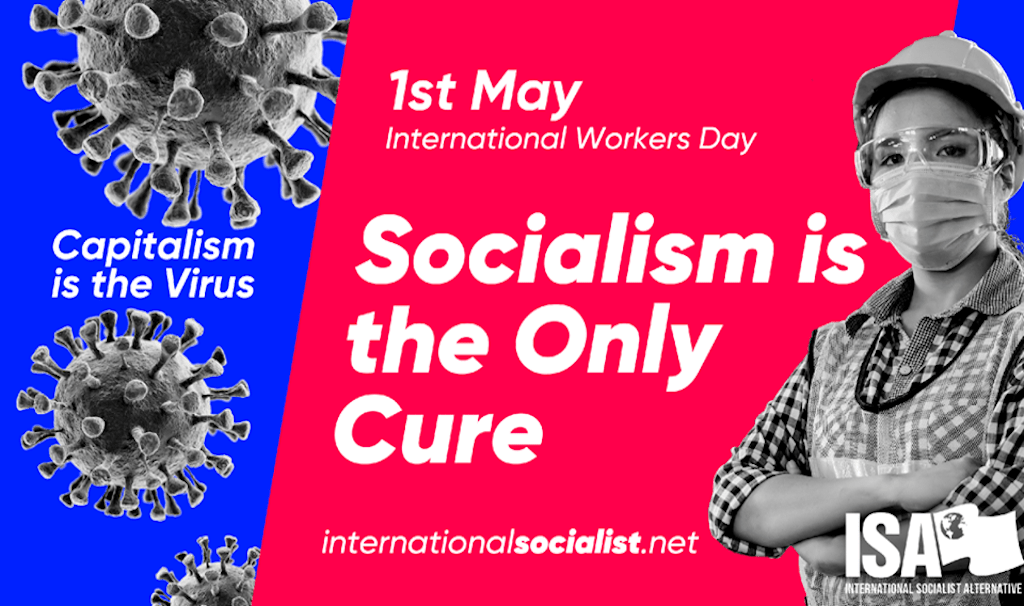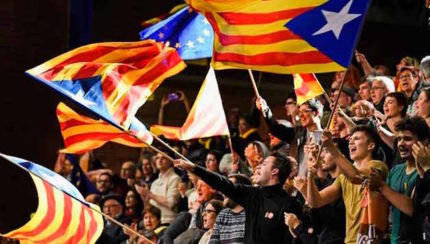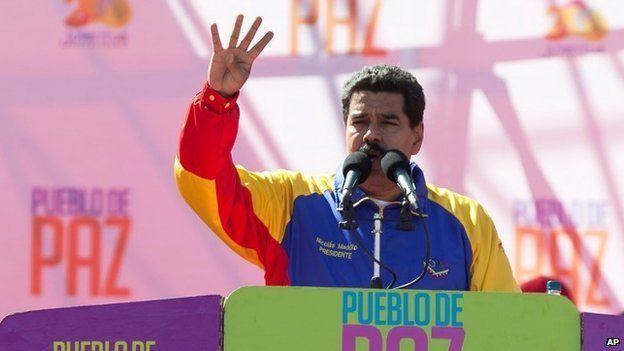Socialists, and all working-class people, must stand in solidarity with the movement for Aboriginal rights, and forge links with Aboriginal activists fighting for a way forward.
On October 14 Australians will vote on the referendum for the Aboriginal and Torres Strait Islander Voice. If the Yes vote wins, parliament will establish the Voice as a limited advisory body to the parliament and cabinet.
This will be written into the constitution in a section that begins, “In recognition of Aboriginal and Torres Strait Islander peoples as the First Peoples of Australia…”. The use of “First Peoples” instead of the more common “First Nations” is important, as the word “nation” implies a group of people with a right to self-determination.
The referendum question is light on details and leaves the exact nature of the Voice in the hands of parliament. The model proposed by the Indigenous Voice Co-design Process in July would be for a body made up of 24 Indigenous people. The method of choosing them would be up to regional institutions of the Voice itself. They say elections could be considered, but this is not a proposal for all Indigenous communities to have guaranteed concrete powers to choose who would stand on the Voice.
The body will have no constitutional powers beyond making “representations” to the government “on matters relating to Aboriginal and Torres Strait Islander peoples.” There aren’t really any issues in Australia that don’t relate to Indigenous people, but this isn’t how the Voice’s scope is meant to be interpreted.
The referendum would give the parliament power to make laws around the “composition, functions, powers and procedures” of The Voice, and its supporters take pains to emphasise that it will be an advisory body only, and that it will have a limited scope.
The Voice is a key plank of the Albanese government’s policy. It is supported by the Greens and parts of the Liberal Party and is the latest stage of the campaign for constitutional recognition. Its roots are in the “Uluru Statement from the Heart” (it should be noted that Anangu people asked for the word ‘Uluru’ to be left out of the statement) and the “Recognise” campaign, both extremely controversial in the movement for Aboriginal rights.
The Invasion Day rallies this year called for a No vote on the Voice to Parliament. Aboriginal speakers in Sydney, Melbourne and everywhere else a rally was held, including prominent activists like Gary Foley, urged crowds to vote against the Voice. Banners on the rallies carried slogans like “Vote no to referendum — We deserve more than a Voice” and “Treaty Before Voice”. Senator Lidia Thorpe, formerly Greens spokeswoman on First Nation issues, left the party in February over their support for the Voice.
Many Indigenous elders and activists — including the Blak Sovereign Movement (which Thorpe is involved with) and the activist group Black People’s Union (BPU) — have pointed to constitutional recognition as an undemocratic process that will undermine the struggle for genuine self determination and sovereignty.
“It will be used to demonstrate that we have acquiesced to the colonial system and that we have given up our Sovereignty and accepted being governed by the colonial government of the King of England. We have not.”
The push for constitutional recognition was specifically intended to do exactly this. In 2007, the Howard government [Conservatives] launched the Northern Territory Intervention, based on slanders of Aboriginal men, suspending the Racial Discrimination Act to send the military into Aboriginal communities. Only months later, John Howard pushed for a referendum on Aboriginal constitutional recognition, on the basis that it would “make us all Australians.” The goal was to hide the division between Aboriginal people and a hostile, colonial national government.
What position should people take?
Many young, working-class people will vote Yes, out of a genuine desire to help improve the situation for First Nations people. But many grassroots Aboriginal activists are calling for a No vote. Despite what the Labor Party, mainstream press, and Yes23 campaign say, the proposal for the Voice has not come about through any democratic discussion.
It was a top-down process that actively ignored what many Indigenous elders and activists were calling for. Organisers of the 2017 Yulara Convention, which produced the Statement from the Heart, were accused of excluding many Indigenous activists they didn’t want to hear from. A number of delegates famously walked out of the convention in protest.
The Regional Dialogues for the Indigenous Voice Co-design Process similarly excluded activists whose views the organisers didn’t like. But even those dialogues “highlighted the demand for Treaty, Truth and Sovereignty, not constitutional recognition or an advisory body.”
Supporters of the Voice claim that 80 percent of First Nations People support the Yes campaign, but this is a misrepresentation of the situation. According to the Black People’s Union, this was taken from a sample group of 300 people, under 0.01 percent of communities. The consultation process has been accused of being opaque and paternalistic. The BPU emphasise that the referendum puts a key decision over Aboriginal affairs into the hands of a voting population that is 98 percent non-Indigenous.
The right-wing is using the referendum as an opportunity to whip up racism, and there will unfortunately be a layer of people motivated by divisive racist and nationalistic ideas who will vote No. Socialists, trade unionists and the broader left should support the progressive Sovereign No campaign, and build a broad movement for Aboriginal rights.
A real Voice lies in a democratic Indigenous movement
Aboriginal people have been fighting against invasion and using their voices for more than two centuries. The government is interested in a Voice that they believe they can control. The Aboriginal Tent Embassy has stood for decades, and all governments have refused to engage with it. We need to build a united movement for Aboriginal rights and build a voice that cannot be ignored.
From the Frontier Wars to the movements of the 1930s and 1940s, Aboriginal people resisted colonial occupation and exploitation. In 1966 the modern land rights movement began with a labour strike, the Wave Hill Walk-Off, led by Gurindji stockman Vincent Lingiari, organising with people like radical Aboriginal union organiser Dexter Daniels. The trade union movement provided material support to the struggle, and pushed the Labor Party in the 1970s to recognise a limited form of land rights, and in the 1980s to establish limited Indigenous control over services.
In the 1970s, a growing Aboriginal movement set up a number of community controlled Indigenous services, in healthcare, legal services, housing and more. Activists converged in places like Redfern in Sydney, and there were links between the anti-war, environment, feminist and Aboriginal movements, including within militant trade unions such as the Builders Labourers Federation. These links were crucial — the connections between the Aboriginal and worker’s movements have deeply impacted people’s understanding of Aboriginal rights.
These movements came into direct conflict with the government and the capitalist system. Capitalism is founded on Indigenous oppression — it requires the continuous dispossession of Indigenous people. There’s a fundamental incompatibility between capitalism and Indigenous social systems and attitudes toward the land, and this has been clear to many Aboriginal people from the beginning.
Demands of Aboriginal people ignored for years
Tens of thousands of people marched for Aboriginal rights during the 1970s and 1809s, and in recent years the movement has reignited with massive annual Invasion Day Marches. Aboriginal people have already been using their voices, and the government has been ignoring them. For three decades, Aboriginal people have been loudly calling for the implementation of the recommendations from the 1991 Royal Commission into Aboriginal deaths in custody.
The Royal Commission itself only happened after a decade of protests. It made 339 recommendations, from decriminalising minor offences, to allowing for a degree of self-determination through Indigenous control of services. The Royal Commission kept coming back to the lack of self-determination as a fundamental problem.
Governments, including some of the same people behind the Yes campaign, have mostly ignored its recommendations, and more than 500 Aboriginal people have died in custody since the commission.
Calls for Treaty, Sovereignty, and self-determination are calls for direct, genuine control by Aboriginal people over their communities, land and the resources to thrive — not advisory bodies that have no power to implement the grassroots demands of the movement.
Aboriginal people have their working rights, land rights, and welfare rights constantly undermined and attacked. Indigenous communities suffer higher poverty and lower life expectancies than others. Racism is then used to blame them for the situation that capitalism has inflicted upon them, belittling their culture. They face constant racist violence and abuse.
Colonisation is about land. Whether it is in Australia, Aotearoa/New Zealand, or anywhere else in the world, it is about the exploitation of both land and people for profit. Dispossession, genocide, cultural and linguistic erasure, slavery, systematic child abduction, forced assimilation policies, forced christianisation and dehumanisation are all tools of the ruling class to exploit and destroy the land, waters and air. Most of these practices are ongoing.
Despite this, the Aboriginal movement has had a deep impact on working people. There is a strong current of solidarity towards Indigenous people, and a clear understanding among many young people that our struggles are all connected.
The demands for Treaty and Sovereignty are demands for genuine self-determination. They are raised within a capitalist system that does not allow self-determination for any of us. The key decisions over our lives are made in boardrooms, or by parliaments who represent the interests of business. These people have a vested interest in preventing Indigenous self-determination.
The vested interests behind The Voice
The Referendum Council for constitutional recognition is made up of some of the country’s wealthiest people, including former CEOs who have held positions in companies like BHP, which profit from Aboriginal land. The Yes23 campaign is sponsored by companies like Commonwealth Bank, ANZ, NAB, BHP, Rio Tinto, South32, Wesfarmers, Woolworths and Coles.
The industries most directly involved in profiting from Aboriginal land — mining, logging, and agriculture — largely support the Voice. Incredibly, the co-chair for the YES campaign group, Australians for Indigenous Constitutional Recognition’s Danny Gilbert, has said:
“This is a nation-building moment. Corporates are corporate citizens, and they are part of the social, economic and political infrastructure of this country. They employ a lot of people and have an interest in building a strong, healthy, inclusive democracy. It’s not in their interest to have a group of people relegated to poverty and disadvantage.”
These corporations are the reason poverty and disadvantage exist at all. Coles, Woolworths and Wesfarmers have all been profit-gouging to create the current cost-of-living crisis, making billions while working people suffer.
Politicians beholden to mining companies have spread racist slanders against Aboriginal people to justify cutting off remote communities. They have changed the law to give Adani access to Jagan and Wangalingou land in Queensland for coal mining, a threat to the entire world. The co-sponsors of Yes23 are actively blowing up Aboriginal sacred sites to clear land for mining.
Former Liberal prime minister John Howard currently opposes the Voice, as do many leading Liberals. The Liberal Party has been in crisis for some time, with an increasingly unhinged right-wing. Liberal leader Peter Dutton is a key figure in this internal crisis, so it’s no surprise that the party would put themselves on the side of racist forces pushing for a No vote. But the Black People’s Union traces the push for the Voice to John Howard’s attempts at constitutional assimilation in 2007, and the controversial Recognise campaign.
Kieran Stewart-Assheton, President of the Black Peoples Union, stated, “People forget that LNP [Conservatives] were in power from 2016–2017 when the Referendum Council was set up, and when those regional dialogues were held and the Yulara convention was held. This wasn’t a Labor initiative, this began as a Liberal initiative and the whole reason it began is they wanted to further undermine our sovereignty. When I say sovereignty what I’m specifically talking about is our right to self-determination and our right to manage our own land.”
There have been multiple Aboriginal and Torres Strait Islander advisory bodies, including a number of bodies set up directly to advise the prime minister’s office. Politicians have always pushed to make them bureaucratic bodies beholden to neoliberal ideology. They have been used as mechanisms for the government to pick and choose which voices get heard.
When Aboriginal people have attempted to take control of these bodies and use them in the interests of Indigenous people, they have been undermined and shut down. The most powerful of these bodies was the Aboriginal and Torres Strait Islander Commission (ATSIC). ATSIC was defunded and eventually dissolved under the Howard government, which was attempting to replace it with a body that was less accessible to Indigenous people and had less control over its own budget.
John Howard gave the reason for the dissolution of ATSIC in 2004, saying: “We believe very strongly that the experiment in separate representation, elected representation, for Indigenous people has been a failure.”
The Voice would not be protected just by being part of the constitution. Constitutionally enshrined bodies can be dissolved and lapse into insignificance, for example, the nonexistent Inter-State Commission, which is still a part of the constitution today. The functioning of the Voice will be under the control of parliament. It is not intended to be anything even resembling ATSIC (which had elements of democratic community control of services and funding), and would be just as easily dissolved by the government if it looked like they were losing control of it.
Who has the power?
The Voice is not intended to be a genuinely democratic body resting on grassroots Aboriginal power — it’s intended to be a tool for lending legitimacy to the government and controlling opposition. The process leading up to it in the Yulara Convention and the Regional Dialogues involved bureaucratic manoeuvres to pick and choose which voices would be heard.
This is also how Aboriginal and Torres Strait Islander advisory committees have been treated by governments in the past, including by some of the same people currently pushing for the Voice. This already shows us what kind of a body they intend to establish.
Parliament itself is not a truly representative body, but a committee that exists to manage the affairs of big business. Power in society is shaped by the direct, private ownership of the economy by a small ruling class of the ultra-rich. Their interests drive colonialism, racism, and ongoing attacks on Aboriginal land.
The struggle for Indigenous self-determination has a goal that is directly at odds with this ruling class. Self determination is not possible under capitalism, and the struggle for socialism is not possible unless it is tied in with the fight for Indigenous self determination. Socialists, and all working-class people, must stand in solidarity with the movement for Aboriginal rights, and forge links with Aboriginal activists fighting for a way forward.
The BPU has made a call for the establishment of treaties between Aboriginal nations across the country, and the building of a Pan Aboriginal movement. They have also called for the struggle to be broadened, to be a working-class struggle.
The working class, both Indigenous and non-Indigenous, is the force that produces all the wealth of society. Because of this, it is the force capable of challenging capitalist control. Workers have a vested interest in taking the economy out of the hands of the ruling class and establishing direct democratic control over society.
To win self-determination for Aboriginal people, alongside democratic self-determination for the entire working-class, a militant working-class movement is essential. With an organised movement setting its own demands, we can win much more than an unrepresentative advisory body (whose functioning remains under the control of the government).
Regardless of the outcome of the referendum, we have to build a united movement that cannot be ignored and lies out of the control of capitalist interests. This movement must fight for a democratic socialist society where the wealth is collectively owned, and there is actual self-determination for all people. The kind of society that fosters Indigenous connection to land and Country.
ISA Australia stands in support of a united Indigenous struggle and a united working-class movement, of both Indigenous and non-Indigenous workers, that raises Aboriginal demands. Working people have a common interest in fighting the capitalist system that oppresses and exploits us all.
We say no to symbolic consultation, yes to genuine self determination.
We say no to NGOs and bureaucratism, and yes to fully funding Aboriginal-controlled services.
We say no to the destruction of sacred sites and the mining of fossil fuels, and yes to genuine democratic land rights. ISA Australia demands:
Put the wealth under community control!
- For Indigenous community-controlled services and Indigenous land rights
- Invest in health, education, housing and social services — create jobs that serve the community through services that are run by the community
- End welfare quarantining and work for the dole — raise unemployment payments to a living wage
- Genuine self-determination through land rights and democratic community control of resources
- Bring all of the major sectors of the economy into democratic worker’s control and create a society run in the interests of everyone — end the system that breeds racism and Indigenous dispossession
Stop funnelling children into the prison system!
- Raise the age of criminal responsibility to 18 — no prison sentences for children
- Invest in culturally appropriate diversion programs and other community services
- End Stolen Generation practices and keep kids at home— prioritise home-based support. Prioritise kinship care and community care so that children who are removed from their home are supported within their own community and culture
- Invest in support that eliminates poverty and trauma as a reason for children being removed from home
Fight racist policing!
- Abolish prison sentences for minor offences
- Abolish “public order” offences that are used to criminalise things like drunkenness, swearing or insulting a police officer
- For independent bodies made up of working-class people to oversee investigations into police — police should not be trusted to investigate themselves
- Jail killer cops and vigilantes, as well as prison guards found to have tortured children
- Sack racist police, prison officers and judges
- For the police to be placed under the democratic control of elected boards of ordinary people, representative of the communities they police
For a united movement to win all of these demands and more!
- For the workers movement to support the proposal for unity among Aboriginal nations, suggested to take the form of Treaties between nations, and the creation of democratic self-governing bodies among Indigenous people
- For the trade union movement to disaffiliate from the Labor Party, and to instead unite with community and activist groups, as well as the Indigenous Sovereignty movement, to create a new party of the working class that unapologetically puts forward a working class agenda that is democratically set by the people, and which sets its sights on challenging the capitalist system and replacing it with a socialist society




